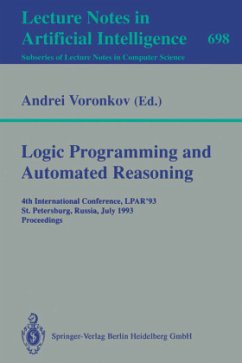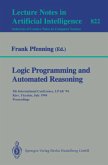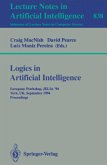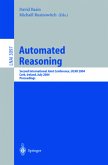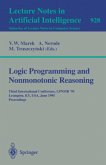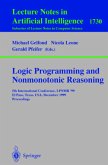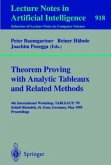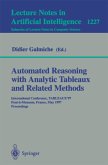Andrei Voronkov (ed.)4th International Conference, LPAR'93, St.Petersburg, Russia, July 13-20, 1993. Proceedings
Logic Programming and Automated Reasoning
4th International Conference, LPAR'93, St.Petersburg, Russia, July 13-20, 1993. Proceedings
Mitarbeit:Voronkov, Andrei
Andrei Voronkov (ed.)4th International Conference, LPAR'93, St.Petersburg, Russia, July 13-20, 1993. Proceedings
Logic Programming and Automated Reasoning
4th International Conference, LPAR'93, St.Petersburg, Russia, July 13-20, 1993. Proceedings
Mitarbeit:Voronkov, Andrei
- Broschiertes Buch
- Merkliste
- Auf die Merkliste
- Bewerten Bewerten
- Teilen
- Produkt teilen
- Produkterinnerung
- Produkterinnerung
LPAR is an international conference series aimed at bringingtogether researchers interested in logic programming andautomated reasoning. The research in logic programming grewout of the research in automated reasoning in the early1970s. Later, the implementation techniques known from logicprogramming were used in implementing theorem provingsystems. Results from both fields applied to deductivedatabases.This volume contains the proceedings of LPAR '93, which wasorganized by the Russian Association for Logic Programming.The volume contains 35 contributed papers selected from 84submissions,…mehr
Andere Kunden interessierten sich auch für
![Logic Programming and Automated Reasoning Logic Programming and Automated Reasoning]() PfenningLogic Programming and Automated Reasoning39,99 €
PfenningLogic Programming and Automated Reasoning39,99 €![Logics in Artificial Intelligence Logics in Artificial Intelligence]() MacNishLogics in Artificial Intelligence39,99 €
MacNishLogics in Artificial Intelligence39,99 €![Automated Reasoning Automated Reasoning]() David Basin / Michael Rusinowitch (eds.)Automated Reasoning77,99 €
David Basin / Michael Rusinowitch (eds.)Automated Reasoning77,99 €![Logic Programming and Nonmonotonic Reasoning Logic Programming and Nonmonotonic Reasoning]() Logic Programming and Nonmonotonic Reasoning39,99 €
Logic Programming and Nonmonotonic Reasoning39,99 €![Logic Programming and Nonmonotonic Reasoning Logic Programming and Nonmonotonic Reasoning]() Michael Gelfond / Nicole Leone / Gerald Pfeifer (eds.)Logic Programming and Nonmonotonic Reasoning39,99 €
Michael Gelfond / Nicole Leone / Gerald Pfeifer (eds.)Logic Programming and Nonmonotonic Reasoning39,99 €![Theorem Proving with Analytic Tableaux and Related Methods Theorem Proving with Analytic Tableaux and Related Methods]() BaumgartnerTheorem Proving with Analytic Tableaux and Related Methods39,99 €
BaumgartnerTheorem Proving with Analytic Tableaux and Related Methods39,99 €![Automated Reasoning with Analytic Tableaux and Related Methods Automated Reasoning with Analytic Tableaux and Related Methods]() GalmicheAutomated Reasoning with Analytic Tableaux and Related Methods39,99 €
GalmicheAutomated Reasoning with Analytic Tableaux and Related Methods39,99 €-
-
-
LPAR is an international conference series aimed at bringingtogether researchers interested in logic programming andautomated reasoning. The research in logic programming grewout of the research in automated reasoning in the early1970s. Later, the implementation techniques known from logicprogramming were used in implementing theorem provingsystems. Results from both fields applied to deductivedatabases.This volume contains the proceedings of LPAR '93, which wasorganized by the Russian Association for Logic Programming.The volume contains 35 contributed papers selected from 84submissions, together with an invited paper by Peter Wegnerentitled "Reasoning versus modeling in computer science".
Produktdetails
- Produktdetails
- Lecture Notes in Computer Science 698
- Verlag: Springer / Springer Berlin Heidelberg / Springer, Berlin
- Artikelnr. des Verlages: 978-3-540-56944-2
- 1993.
- Seitenzahl: 408
- Erscheinungstermin: 29. Juni 1993
- Englisch
- Abmessung: 235mm x 155mm x 23mm
- Gewicht: 533g
- ISBN-13: 9783540569442
- ISBN-10: 3540569448
- Artikelnr.: 09247280
- Herstellerkennzeichnung
- Springer-Verlag GmbH
- Tiergartenstr. 17
- 69121 Heidelberg
- ProductSafety@springernature.com
- Lecture Notes in Computer Science 698
- Verlag: Springer / Springer Berlin Heidelberg / Springer, Berlin
- Artikelnr. des Verlages: 978-3-540-56944-2
- 1993.
- Seitenzahl: 408
- Erscheinungstermin: 29. Juni 1993
- Englisch
- Abmessung: 235mm x 155mm x 23mm
- Gewicht: 533g
- ISBN-13: 9783540569442
- ISBN-10: 3540569448
- Artikelnr.: 09247280
- Herstellerkennzeichnung
- Springer-Verlag GmbH
- Tiergartenstr. 17
- 69121 Heidelberg
- ProductSafety@springernature.com
Entailment and disentailment of order-sorted feature constraints.- Computing extensions of default logic - Preliminary report.- Prolog with arrays and bounded quantifications.- Linear 0-1 inequalities and extended clauses.- Search space pruning by checking dynamic term growth.- A proof search system for a modal substructural logic based on labelled deductive systems.- Consistency checking of automata functional specifications.- Yet another application for Toupie: Verification of mutual exclusion algorithms.- Parsing with DCG-terms.- A first order resolution calculus with symmetries.- Ordered paramodulation and resolution as decision procedure.- Static analysis of Prolog with cut.- A new type theory for representing logics.- Verification of Switch-level designs with many-valued logic.- Deciding in HFS-theory via linear integer programming.- The completion of typed logic programs and SLDNF-resolution.- Increasing the versatility of heuristic based theorem provers.- Sequentialization of parallel logic programs with mode analysis.- Refinements and extensions of model elimination.- Executable specifications based on dynamic algebras.- Generic resolution in propositional modal systems.- Optimized translation of multi modal logic into predicate logic.- Default reasoning with a constraint resolution principle.- Non-clausal deductive techniques for computing prime implicants and prime implicates.- Unification under one-sided distributivity with a multiplicative unit.- Unification in Order-Sorted Logic with Term Declarations.- Extracting inheritance hierarchies from Prolog programs: A system based on the inference of type relations.- A comparison of mechanisms for avoiding repetition of subdeductions in chain format linear deduction systems.- Neutralization and preemption inextended logic programs.- MULTLOG: A system for axiomatizing many-valued logics.- SKIL: A system for programming with proofs.- Reasoning about the reals: the marriage of HOL and maple.- System description of LAMBDALG.- Mixing metafor.- A complete axiom system for isomorphism of types in closed categories.- Reasoning, modeling, and component-based technology.
Entailment and disentailment of order-sorted feature constraints.- Computing extensions of default logic - Preliminary report.- Prolog with arrays and bounded quantifications.- Linear 0-1 inequalities and extended clauses.- Search space pruning by checking dynamic term growth.- A proof search system for a modal substructural logic based on labelled deductive systems.- Consistency checking of automata functional specifications.- Yet another application for Toupie: Verification of mutual exclusion algorithms.- Parsing with DCG-terms.- A first order resolution calculus with symmetries.- Ordered paramodulation and resolution as decision procedure.- Static analysis of Prolog with cut.- A new type theory for representing logics.- Verification of Switch-level designs with many-valued logic.- Deciding in HFS-theory via linear integer programming.- The completion of typed logic programs and SLDNF-resolution.- Increasing the versatility of heuristic based theorem provers.- Sequentialization of parallel logic programs with mode analysis.- Refinements and extensions of model elimination.- Executable specifications based on dynamic algebras.- Generic resolution in propositional modal systems.- Optimized translation of multi modal logic into predicate logic.- Default reasoning with a constraint resolution principle.- Non-clausal deductive techniques for computing prime implicants and prime implicates.- Unification under one-sided distributivity with a multiplicative unit.- Unification in Order-Sorted Logic with Term Declarations.- Extracting inheritance hierarchies from Prolog programs: A system based on the inference of type relations.- A comparison of mechanisms for avoiding repetition of subdeductions in chain format linear deduction systems.- Neutralization and preemption inextended logic programs.- MULTLOG: A system for axiomatizing many-valued logics.- SKIL: A system for programming with proofs.- Reasoning about the reals: the marriage of HOL and maple.- System description of LAMBDALG.- Mixing metafor.- A complete axiom system for isomorphism of types in closed categories.- Reasoning, modeling, and component-based technology.

